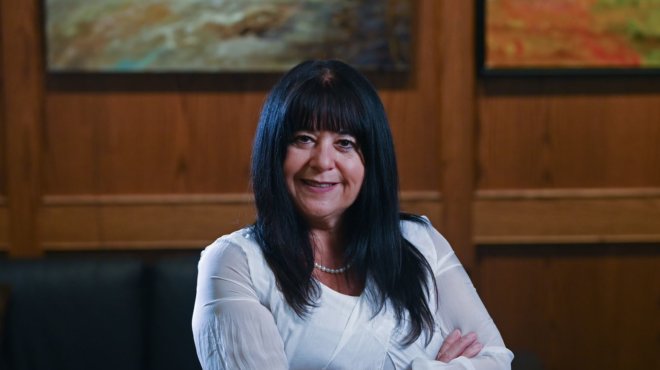
Promoting wellness: Dr. Patricia Lingley-Pottie pioneers virtual mental health services
By Mark Campbell
Knowing how vital mental health is to alleviating suffering and overall well-being, Halifax-based IWK Health Centre scientist Patricia Lingley-Pottie (BN’88, PhD’11) co-founded the Strongest Families Institute to deliver telephone and online mental wellness services.
When Dr. Patricia Lingley-Pottie was a nurse in the kidney transplantation unit at Sick Kids Hospital in Toronto, she spent many of her days off with her patients, braiding their hair or playing games with them.
“My focus, beyond my nursing duties, was to improve their mental well-being,” Dr. Lingley-Pottie recalls. “When they had invasive procedures, I always helped them prepare for that mentally.”
Those experiences inspired Dr. Lingley-Pottie and set her life on a new and impactful path to ensure that Canadians, especially from underserved populations, have access to mental health services. Working with Dr. Patrick J. McGrath, she co-founded and is CEO/President of Strongest Families Institute (SFI), a ground-breaking initiative that brought mental health support into the internet era. Through IRIS, its dynamic online platform, and a team of telephone coaches, it delivers evidence-based, bilingual mental health services to Canadians where they need them and when they need them.
Home-based mental health care reduces stigma
“We put our program online when we developed our first electronic system in 2012, which, in its day, was very innovative, but with today’s advanced technology, our first system now seems rather unsophisticated,” Dr. Lingley-Pottie says. “But in doing so, we overcame access barriers and pioneered virtual pediatric mental health and family health. By enabling people to get help in the comfort and privacy of their homes, there is no stigma. Instead, there is a strong therapeutic alliance, strong outcomes and a very sophisticated system.”
Initially, SFI focused on serving children and youth. But the initiative has expanded in recent years to provide customized programming to adults, under-represented groups such as the BIPOC and LGBTQ2+ communities, and military families—an offering that has particular resonance for Dr. Lingley-Pottie. “My grandfather was a veteran, and when he returned from service, my grandparents got divorced,” she says. “My mother was very young at the time and was impacted by that. I always vowed that I was going to make a difference among people in the military.”
To date, SFI has worked with more than 50,000 clients from across Canada and maintained a success rate of over 85 per cent in outcomes across all demographics, with clients achieving reductions in their symptoms and functional improvement. Moreover, it has maintained a dropout rate of less than 10 per cent, which Dr. Lingley-Pottie says is extremely low for mental health services.
These achievements mean a lot to Dr. Lingley-Pottie, as do the recognition and awards that SFI has received. They include the Governor-General’s Social Innovation Award, the Ernest C. Manning Award, the Mental Health Commission of Canada Award and now, the Aurum Award. As a Dalhousie alumnus, she considers it validation of the sacrifices she has made to create change for others, starting with the decision to leave home and earn her nursing degree at Dalhousie.
Advancing technology to reach even more people
Dr. Lingley-Pottie and her team are continually looking for new ways to have a positive impact. SFI is tracking and reporting all client outcomes. It has introduced an interactive app that not only enables clients to access SFI materials using their mobile phones but also enjoys the same experience even when a wireless connection is not available. And it has enhanced several programs based on user feedback while offering lower intensity intervention options based on client needs. The goal now, she says, is to ensure all Canadians have equal access to SFI’s proven programs. That means addressing geographical barriers and developing an integrated diversity, equity, inclusion and accessibility strategy to increase awareness and access among underserved populations.
“We know that we have very strong impacts among people of different backgrounds,” she says. “I hope we continue to expand both nationally and, at some point, internationally. As we do, we are recognized not just as pioneers in pediatric virtual mental health services but also family-focused and adult virtual services.”